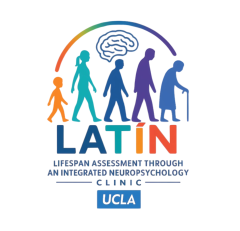LATIN Clinic
Find your care
We provide targeted care for pediatric, adult and geriatric patients. Call 800-825-9989 or 310-825-9989 to learn more about our psychiatry services.
Clinic Overview

The LATíN-C is a training clinic dedicated to providing inpatient and outpatient neuropsychological and psychodiagnostic evaluations for bilingual and monolingual Spanish-speaking as well as Hispanic/Latine patients across the lifespan. Referrals come from health professionals within the UCLA Health system and the broader community.
We serve pediatric, adult, and geriatric populations presenting with a wide range of conditions affecting cognitive function. Common referral reasons include:
- Pre-surgical evaluations (epilepsy, tumor, vascular, deep brain stimulation [DBS])
- Pre-organ transplant assessments
- Differential diagnosis of dementias
- Clarification of neuropsychiatric disorders
- Medical referrals from specialties including Neurology, Psychiatry, and other disciplines
Our Mission
LATíN-C is grounded in a mission that goes beyond equal care-we aim for equitable care, explicitly addressing the health disparities impacting limited English proficiency (LEP) patients and the broader Latine community.
Our clinic uses a bilingual/bicultural model of neuropsychological assessment based on empirically supported best practices for culturally and linguistically diverse populations. Evaluations are responsive to each patient's cultural, linguistic, and contextual background, supporting more accurate diagnosis and treatment recommendations.
Who We Serve
We evaluate children, adolescents, transitional-aged youth, adults, and older adults who:
- Are bilingual or monolingual Spanish speakers, or
- Self-identify as Hispanic or Latine, regardless of language preference or dominance
Pediatric Neuropsychology
We offer comprehensive evaluations for children and young adults (approximately ages 5-22) for a range of clinical and developmental concerns, including:
- Neurodevelopmental conditions (e.g., ADHD, learning disabilities)
- Medical and neurological issues (e.g., epilepsy, brain tumors, genetic syndromes, TBI, psychiatric conditions, organ transplants)
Our assessments are often recommended to:
- Clarify diagnosis
- Guide treatment planning
- Support educational accommodations
- Monitor response to interventions
We take an intersectional, neurodiversity-affirming approach, informed by research on bilingual language development, cultural influences on cognition, and systemic factors impacting achievement. Our goal is to empower children and families by delivering evidence-based, culturally informed evaluations that address day-to-day challenges and promote thriving.